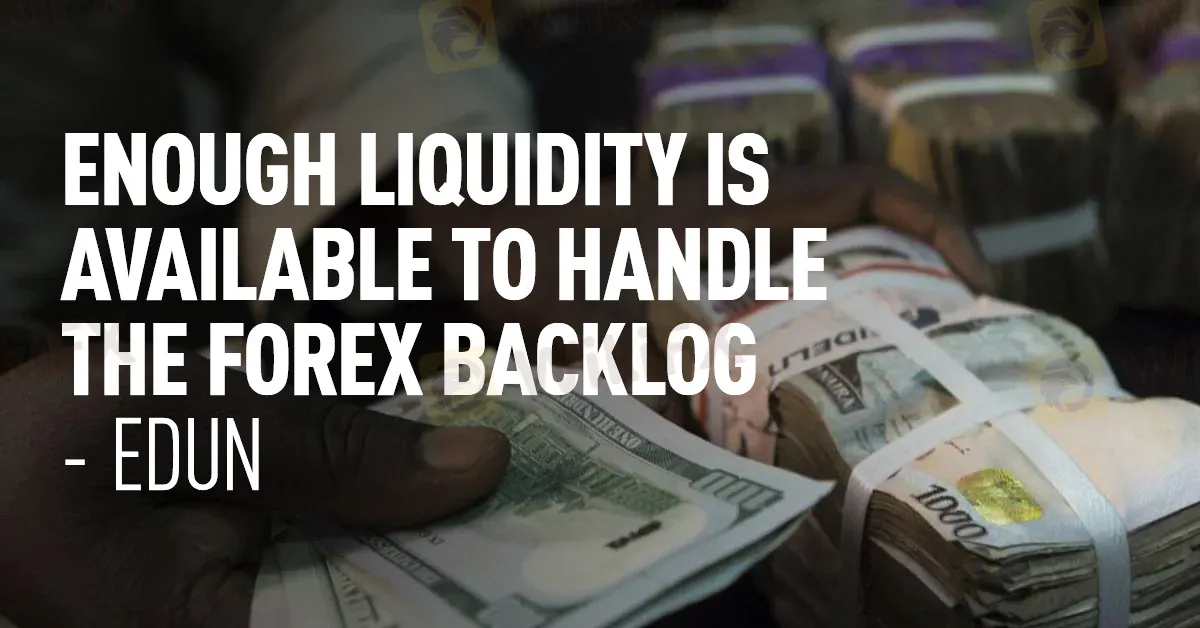简体中文
繁體中文
English
Pусский
日本語
ภาษาไทย
Tiếng Việt
Bahasa Indonesia
Español
हिन्दी
Filippiiniläinen
Français
Deutsch
Português
Türkçe
한국어
العربية
ENOUGH LIQUIDITY IS AVAILABLE TO HANDLE THE FOREX BACKLOG- EDUN
Abstract:Mr. Wale Edun, the Finance and Coordinating Minister of the Economy of Nigera, has guaranteed that there will be enough liquidity in the banking industry to lower the backlog of foreign exchange (FX).

Mr. Wale Edun, the Finance and Coordinating Minister of the Economy of Nigera, has guaranteed that there will be enough liquidity in the banking industry to lower the backlog of foreign exchange (FX).
In an interview with Bloomberg on Wednesday, Edu stated that the Central Bank of Nigeria (CBN) is working to reduce the foreign exchange backlog, which stands at approximately $5 billion.
The government thinks it can pay down the backlog almost immediately, so he said there should be a method for the banks to help with the backlog, either on a spot or a forward-rate basis.
He stated, “There should be a way to get the banks to actually help with that backlog, either on a spot or a forward-rate basis. There is actually liquidity within the banking system.”
“We think that the backlog can be nearly cleared in one fell swoop if we utilize the available funds.”
The minister expressed confidence that it could be resolved quickly if efforts to increase oil revenue and mobilize resources that are now in the economy are successful.
When asked about the government's proposal to borrow $1.5 billion from the World Bank, Edun replied that the government's changes deserve financial support from the Bretton Woods institution.
“We anticipate receiving $1 billion or $1.5 billion from the World Bank,” Edun went on to say.
“Although it is still up for debate, we believe that because we are pushing through with our reforms, we will receive support. ”We should be applauded for our efforts to modernize the foreign currency market and reduce gasoline subsidies. We should obtain our reward right now because we have done enough.
Additionally, Edun expressed the nation's confidence in its ability to access the Eurobond market, noting that preparations are in place to do so later this year should interest rates drop enough.
He continued, “We have been informed by the book runners and major issuers that Nigeria ought to have a window in the Eurobond market.”
The finance minister stated that the government intends to use all available liquidity in order to stabilize the naira.
“The main goal is to stabilize the naira, which entails bringing in more liquidity, primarily from oil revenue,” stated Edun.
Additionally, we want to make sure that we have access to Nigerian savings, namely local dollar savings from both inside and outside of the official market. The Nigerian economy has a lot of money.
The naira, the currency of Nigeria, and the foreign exchange market have both experienced volatility since the unification of the exchange rate windows.
Businesses have been impacted by the naira's inability to meet importers' and exporters' needs during transactions because of the scarcity of dollars in the foreign exchange market.
Through the implementation of strategic reforms, the federal government and the apex bank have attempted to revitalize the economy.
The federal government has boosted oil production, renovated the Port Harcourt refinery, and assisted the Dangote refinery in its operations as a means of achieving economic stability.

Disclaimer:
The views in this article only represent the author's personal views, and do not constitute investment advice on this platform. This platform does not guarantee the accuracy, completeness and timeliness of the information in the article, and will not be liable for any loss caused by the use of or reliance on the information in the article.
Read more

Common Tactics Used in Online Trading Fraud Today
Know the top online trading scams of 2025, from fake apps to pump-and-dump tricks. Simple tips to spot and avoid them, keeping your money safe in this easy guide.

RM1.29 Million Lost in ‘C Baird VIP’ WhatsApp Scam
A 43-year-old company auditor and subcontractor in Malaysia became the latest victim of an elaborate investment scam after losing RM1.29 million to a fraudulent scheme promoted via WhatsApp.

U.S. March ISM Manufacturing PMI Released
The U.S. March ISM Manufacturing PMI data shows that manufacturing has contracted for the first time, and investors should pay attention to future changes and impacts on the sector.

Breaking News! Forex Inflows Surge to $17 Billion
Nigeria's foreign exchange inflows saw a significant increase in the fourth quarter of 2024, reaching $17.39 billion. This growth reflects strong foreign investments and export revenues, bringing new confidence to the market.
WikiFX Broker
Latest News
Exposing the Top 5 Scam Brokers of March 2025: A Closer Look by WikiFX
Gold Prices Climb Again – Have Investors Seized the Opportunity?
Webull Launches SMSF Investment Platform with Zero Fees
Australian Regulator Warns of Money Laundering and Fraud Risks in Crypto ATMs
FCA Warns Against 10 Unlicensed or Clone Firms
CySEC Warns Against 14 Unlicensed Investment Websites
Top Currency Pairs to Watch for Profit This Week - March 31, 2025
Will natural disasters have an impact on the forex market?
Philippines Deports 29 Indonesians Linked to Online Scam Syndicate in Manila
The Withdrawal Trap: How Scam Brokers Lure Victims into Paying More
Currency Calculator








